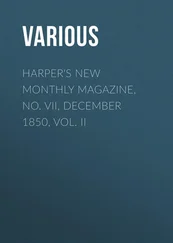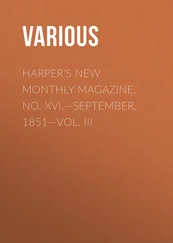Various - Harper's New Monthly Magazine, No. XXIV, May 1852, Vol. IV
Здесь есть возможность читать онлайн «Various - Harper's New Monthly Magazine, No. XXIV, May 1852, Vol. IV» — ознакомительный отрывок электронной книги совершенно бесплатно, а после прочтения отрывка купить полную версию. В некоторых случаях можно слушать аудио, скачать через торрент в формате fb2 и присутствует краткое содержание. Издательство: Иностранный паблик, Жанр: periodic, foreign_edu, на английском языке. Описание произведения, (предисловие) а так же отзывы посетителей доступны на портале библиотеки ЛибКат.
- Название:Harper's New Monthly Magazine, No. XXIV, May 1852, Vol. IV
- Автор:
- Издательство:Иностранный паблик
- Жанр:
- Год:неизвестен
- ISBN:нет данных
- Рейтинг книги:4 / 5. Голосов: 1
-
Избранное:Добавить в избранное
- Отзывы:
-
Ваша оценка:
- 80
- 1
- 2
- 3
- 4
- 5
Harper's New Monthly Magazine, No. XXIV, May 1852, Vol. IV: краткое содержание, описание и аннотация
Предлагаем к чтению аннотацию, описание, краткое содержание или предисловие (зависит от того, что написал сам автор книги «Harper's New Monthly Magazine, No. XXIV, May 1852, Vol. IV»). Если вы не нашли необходимую информацию о книге — напишите в комментариях, мы постараемся отыскать её.
Harper's New Monthly Magazine, No. XXIV, May 1852, Vol. IV — читать онлайн ознакомительный отрывок
Ниже представлен текст книги, разбитый по страницам. Система сохранения места последней прочитанной страницы, позволяет с удобством читать онлайн бесплатно книгу «Harper's New Monthly Magazine, No. XXIV, May 1852, Vol. IV», без необходимости каждый раз заново искать на чём Вы остановились. Поставьте закладку, и сможете в любой момент перейти на страницу, на которой закончили чтение.
Интервал:
Закладка:
The preliminary proceedings were all much the same as they had been in the case of Antonio. When these had been gone through, the judge called upon the county attorney to proceed. After a short opening speech he said, that his first witness was Mr. Kerber. Mr. Kerber was called, and took his place upon the stand.
Mr. Kerber first gave an account of the robbery, describing the situation of his office and of the two doors leading to it, and of the desk in the corner, and narrating all the circumstances relating to the appearance of his office on the Monday morning, and the discovery of the strong box under the ruins of the corn-barn. He then proceeded as follows:
"For a time I considered it certain that Antonio, the one who was first suspected, was the one really guilty, and made no effort or inquiry in any other direction until he was tried. I was convinced then that he was innocent, and immediately began to consider what I should do to find out the robber. I examined the hole again which had been bored into the door, and the marks of the tools by which the desk had been broken open. I thought that I might, perhaps, possibly find the tools that fitted these places somewhere about town, and that if I should, I might, possibly, in that way, get some clew to the robbers. So I borrowed the bits and the chisels of several of my neighbors, but I could not find any that would fit.
"At last I happened to think of some old tools that I had in a back room, and on comparing them I found two that fitted exactly. There was a bit which just fitted the hole, and there were some fibres of the wood which had been caught upon the edge of the bit, where it was dull, that looked fresh and compared well with the color of the wood of the door. There was a large chisel, too, that fitted exactly to the impressions made upon the wood of the desk, in prying it open.
"I could see, too, that some of these tools had recently been moved, by the dust having been disturbed around them. There were marks and tracks, too, in the dust, upon a bench, where some boy had evidently climbed up to get the tools. I tried one of Rodolphus's shoes to these tracks, and found that it fitted exactly."
While Mr. Kerber was making these statements, Rodolphus hung his head, and looked utterly confounded.
"Just about the time," continued Mr. Kerber, "that I made these discoveries, a person came to me and informed me – "
"Stop," interrupted Mr. Keep. "You are not to state what any other person informed you. You are only to state what you know personally, yourself."
Mr. Kerber was silent.
The county attorney, who knew well that this was the rule in all trials, said that he had nothing more to ask that witness then, but that he would withdraw him for a time. He then called Antonio. Antonio took his place upon the stand.
After the oath was administered as usual, the county attorney began to question Antonio as follows:
"Were you in Hiburgh on the night of this robbery?"
"I was," said Antonio.
"At what time did you arrive there?" asked the attorney.
"I believe it was a little past nine," said Antonio.
"Were you at the corn-barn when it took fire?"
"I was," said Antonio.
"State now to the jury what it was that led you to go there."
Antonio recollected that what first attracted his attention and led him to go out, was seeing Rodolphus and the other boys going by with their lantern, and hearing their suppressed voices; and he perceived that if he went any further in his testimony he should prove Rodolphus to be guilty; so he stopped, and after a moment's pause, he turned to the judge, and asked whether he could not be excused from giving any more testimony.
"On what ground do you wish to be excused?" said the judge.
"Why, what I should say," said Antonio, "might go against the boy, and I don't wish to say any thing against him."
"You can not be excused," said the judge, shaking his head. "It is very often painful to give testimony against persons accused of crime, but it is a duty which must be performed."
"But there is a special reason," said Antonio, "in this case."
"What is the reason?" said the judge.
Antonio hesitated. At length he said timidly,
"His sister saved my life."
Here there was a pause. The preferring such a request, to be excused from testifying, and for such a reason, is a very uncommon occurrence in a court. The judge, the jury, the lawyers, and all the spectators looked at Antonio, who stood upon the witness's stand all the time, turning his face toward the judge, awaiting his decision.
After a pause the judge said,
"Your unwillingness to do any thing to injure the brother of a girl who saved your life, does you honor, and I would gladly excuse you if I could, but it is not in my power. The ends of justice require that you should give your testimony, whatever the consequences may be."
"What would be done," asked Antonio, "if I should refuse to do so?"
"Then you would be sent to prison yourself," said the judge, "for contempt of court."
"And suppose I am willing to go to prison," said Antonio, "rather than testify against Ellen's brother; can I do so?"
The judge looked a little perplexed. What answer he would have given to this question we do not know, for he was prevented from answering it, by the county attorney, who here rose and said,
"May it please your honor, I will withdraw this witness for the present. I shall be glad to get along without his testimony, if possible, and perhaps I can."
Antonio then left the stand, very much relieved. Rodolphus wondered who would be called next. His heart sank within him, when he saw an officer who had gone out a moment before, come in and lead Gilpin to the witness-stand.
It is customary in almost all countries, whenever a crime is committed, and it is not possible to ascertain who committed it by any ordinary proofs, to allow any one of the accomplices who is disposed to do so, to come forward and inform against the rest, and then to exempt him from punishment in consideration of his so doing. It seems very base for one person to lead another into sin, or even to join him in it, and then to assist in bringing his accomplice to punishment, in order to escape it himself. But they who combine to commit crimes, must be expected to be base. Gilpin was so. There seemed to be nothing noble or generous in his nature. As soon as he found out that Rodolphus was suspected, he feared that Rodolphus would confess, and then that he should himself be seized. Accordingly, he went immediately to Mr. Kerber, and told him that he knew all about the robbery, and that he would tell all about it, if they would agree that he should not come to any harm.
This arrangement was finally made. They, however, seized Gilpin, and shut him up, so as to secure him for a witness, and he had been in prison ever since Rodolphus's arrest, though Rodolphus knew nothing about it. Christopher had run away the moment he heard of Rodolphus's arrest, and nothing had since been heard of him. Gilpin was now brought forward to give his testimony.
There was a great contrast in his appearance, as he came upon the stand, from that of Antonio. He looked guilty and ashamed, and he did not dare to turn his eyes toward Rodolphus at all. He could not go forward himself and tell a connected story, but he made all his statements in answer to questions put to him by the county attorney. He, however, in the end, told all. He explained how Rodolphus had first cut a hole in the partition, and then he narrated the conversation which the boys had held together behind the wall. He told about the tools, and the dark lantern, and the breaking in; also about going to the corn-barn, burying the box, and then of the accidental setting of the straw on fire, and of Antonio's suddenly coming in among them. In a word, the whole affair was brought completely to light. Mr. Keep questioned Gilpin afterward very closely, to see if he would contradict himself, and so prove that the story which he was telling, was not true; but he did not contradict himself, and finally he went away.
Читать дальшеИнтервал:
Закладка:
Похожие книги на «Harper's New Monthly Magazine, No. XXIV, May 1852, Vol. IV»
Представляем Вашему вниманию похожие книги на «Harper's New Monthly Magazine, No. XXIV, May 1852, Vol. IV» списком для выбора. Мы отобрали схожую по названию и смыслу литературу в надежде предоставить читателям больше вариантов отыскать новые, интересные, ещё непрочитанные произведения.
Обсуждение, отзывы о книге «Harper's New Monthly Magazine, No. XXIV, May 1852, Vol. IV» и просто собственные мнения читателей. Оставьте ваши комментарии, напишите, что Вы думаете о произведении, его смысле или главных героях. Укажите что конкретно понравилось, а что нет, и почему Вы так считаете.












